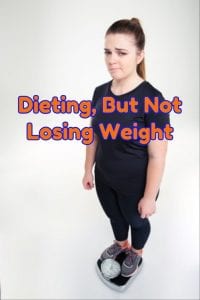 The disappointment of dieting but not losing weight is an all too familiar scenario for many of us.
The disappointment of dieting but not losing weight is an all too familiar scenario for many of us.
We cut our calorie intake all week but come to weigh-in time, find the dial on the scale hasn’t budged.
Or worse still, the number staring back at us is higher than it was the previous week.
When faced with this discouraging and frustrating reality, motivation can wane, and we may give up on dieting.
Before doing so, read on to determine if one or more of the following 7 common reasons for being overweight could explain why you’re dieting but not losing weight.
Table of Contents
7 Common Reasons you Could be Dieting but Not Losing Weight
1) You’re Consuming Too Few Calories
If you’re dieting but not losing weight, your daily calorie consumption is the first thing to consider.
Eating less does not necessarily equate to faster or more significant weight loss. When daily food intake falls below 1,200 calories, our metabolism slows to hold on to energy.
Skipping meals to lose weight is equally detrimental. People who do this are often puzzled about how they can eat less yet still weigh the same.
In this situation, many will either temporarily break their diet out of frustration or abandon it altogether.
One of the biggest mistakes dieters make is skipping breakfast. Eating a morning meal signals our body to start burning calories. When we fail to eat breakfast, our body assumes its food supply is scarce.
A 300 to 500 calorie breakfast that includes 10 to 15 grams of protein and fiber, consumed within an hour of waking, will set calorie burning in motion.
2) You’re Eating More Than You Realize
Some people are eating too few calories to lose weight. Others who are dieting but not losing weight are taking in more calories than they realize.
Recording what you eat will make you more aware of how many calories you consume.
A recent US study revealed that dieters who monitored their daily food intake using online software stuck with their diet longer than those who didn’t record their intake and longer than those who kept a simple manual record.
Interestingly, it was also found that dieters who track their weight loss online generally eat more fruit and vegetables than other dieters.
Another study found that recording food consumption online just once a month is beneficial.
Dieters who do this are three times more likely to maintain their weight loss for longer than two years. And, they can do so with less effort than those who diet but don’t keep a food diary.
3) You Use Food as a Reward for Exercising
Another thing to do if you’re dieting but not losing weight is to calculate the number of calories you are burning during  workouts. Many dieters make the mistake of overestimating this, so they end up back at square one.
workouts. Many dieters make the mistake of overestimating this, so they end up back at square one.
Rewarding yourself with a healthy treat for sticking to your workout routine is fine. That is, providing the treat doesn’t contain too many calories.
Indulging in a 300 calorie treat after having burned 300 calories during a workout defeats the purpose of working out if weight loss is your aim.
Frozen fruit is an ideal treat for dieters. Two of my favorite fruits to freeze are bananas and grapes. When frozen, banana takes on the texture of ice cream, and grapes become quite creamy, not unlike candy.
At around 50 calories for half a frozen banana and 50 calories for half a cup of frozen grapes, these make delicious healthy snacks that will satisfy even the sweetest tooth.
The easiest way I’ve found to freeze bananas is to peel them and wrap them whole in aluminum foil. If you’ll be eating the bananas within two or three days, they shouldn’t turn brown.
If you plan on keeping the bananas frozen any longer, dipping them in lemon juice will stop the oxidation process. Alternatively, freeze them with their skins on. Removing the skin will be fiddly, though.
Rinse and dry grapes before freezing them. Pop them into a Ziploc bag in bunches, or remove the grapes from the stem and place seven or eight into each bag before freezing.
Keep in mind that either way; they will stick together when frozen.
To get around this, remove the stems and place the grapes on a tray lined with non-stick baking paper, ensuring none overlap. Pop the tray into the freezer; then, once the grapes are frozen, put them into an airtight container then back into the freezer for storage.
Click here to read an article on dieting mistakes that can sabotage weight loss.
Dieting but not losing weight – could stress be a factor?
4) Your Friends or Family Members are Overweight
The likelihood of carrying extra pounds increases if your immediate family members or friends are overweight. In fact, a 2010 study showed that our odds of being obese doubles for every four obese friends or close family members we have.
This is thought to be because our perception of what overweight is, changes when we are regularly around people who carry a lot of excess weight.
(It’s interesting to note that this altered perception does not affect people with an overweight acquaintance or neighbor they know only casually.) Moreover, we tend to subconsciously adopt our family’s and friends’ lifestyles and pick up their habits.
For example, if we go to a cafe with them and they order a burger with cheese, fries, and a dessert, we may choose the same even if we originally intended to order a salad and yogurt.
Of course, distancing ourselves from family members or dropping our overweight friends is not the answer. But why not suggest to them that you work out together? Researchers have found that having a workout partner or partners can turn a hard slog into an enjoyable experience.
Working out with friends or family will give you a chance to catch up on the day’s events. It will also make sticking to a workout schedule easier. One reason for this is that we will likely not want to let the others down by backing out.
A little healthy competition and friendly rivalry can come into play, too. If one group member loses weight, the others will often try harder to match their success. This keeps the motivation to lose weight alive.
5) You’ve Eliminated Oils and Carbohydrates from Your Diet
If you’ve been dieting but not losing weight, you may think cutting out oils and carbs will speed up the weight loss  process.
process.
This approach may work short term. However, drastically cutting back on or eliminating a food group, such as this one, can leave us short on the nutrients necessary for energy production.
When dieting, it’s best to eat a variety of foods including healthy fats such as those found in olive oil, nuts, and avocados. You should also include good carbs, as are found in fruit, vegetables, and whole grains.
In fact, some of the most effective foods that burn fat are often mistakenly considered to be off-limits by some due to their oil and carbohydrate content. Regularly including these fat-burning foods in your diet can help us lose weight and keep it off.
The main reason low-carb diets fail is that they are not sustainable long-term. And, after quitting a highly restrictive diet, we tend to regain the weight we lost.
Often we gain some extra pounds as well, so end up weighing more than we did before starting the diet.
When this occurs, our next weight loss attempt will be an even greater challenge as there will be more weight to lose.
Click here to read The Real Truth About Carbs and Weight Loss.
6) You Drink a Lot of Diet Soda
We may think we are doing the right thing by consuming low-calorie beverages. However, research indicates that drinks such as diet soda can sabotage weight loss.
This is because when we consume something sweet that contains few or no calories, our bodies tend to store as fat any other calories consumed.
A recent ten-year study showed that people who regularly consumed diet soda saw a 178% greater waistline expansion than those who refrained from drinking it.
The reason for this is that artificial sweeteners can lift insulin levels and lower blood sugar. This has the effect of stimulating our appetite. It can also cause calories consumed to be stored as fat.
Additionally, artificial sweeteners don’t usually do a great job of satisfying a sugar craving. Real sugar triggers a more sustained release of dopamine, a neurotransmitter that induces feelings of pleasure and satisfaction.
When we drink diet soda to appease a sugar craving, we will often drink more than one and still not be satisfied. Getting just a hint of sweetness can make us more likely to reach for ice cream, chocolate, candy or some other diet no-no to fill the void.
7) You’ve Stopped Drinking Wine
New US research revealed that women who drank one to two standard (5 fluid ounce) glasses of wine per day gained less weight throughout a thirteen-year study than those who abstained from drinking.
A weight gain of 3 1/2 pounds was recorded for the wine drinkers and 8 pounds for the non-wine drinkers.
The study, which involved close to 20,000 female participants, showed a similar result for drinkers of spirits and beer.
The women who drank wine proved to be the most successful at keeping weight off.
Moderate wine consumption is thought to help keep weight in check because digesting alcohol burns calories.
While this is true for both sexes, women burn more calories during the alcohol digestion process than men. This is because the female body produces less of the enzymes that metabolize alcohol.
When drinking alcohol, to digest it, these enzymes must be produced in greater quantity. This, alone, burns additional calories.
Furthermore, when we drink alcohol, our body temperature increases, resulting in the burning of even more calories.
With some diseases linked to daily alcohol consumption, this does not mean that tea-totallers wanting to lose weight should take up drinking.
It does mean that dieters who enjoy wine in moderation can indulge with a clear conscience.
So if you’ve been dieting but not losing weight, an occasional glass of vino with your evening meal won’t hurt. And if the outcome of the research above is accurate, it may well help your weight loss efforts.
Dieting but not Losing Weight Summary
If you are dieting but not losing weight, incorporating one or more of the tips above could be just the thing you need to set you on the path to weight loss success.
Remember, fad diets and those that severely limit calorie intake do not work long term. Not only do they usually result in extra weight gain once the diet ends, but they can also cause health problems.
A healthy, low-calorie sustainable diet combined with regular exercise will give lasting weight loss results and put an end to the dreaded dieting but not losing weight scenario.
Click this link for tips on overcoming a weight loss plateau

